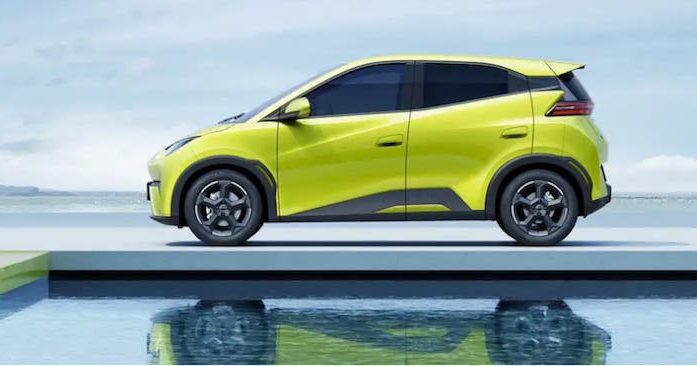Chinese battery-electric-vehicle maker BYD continues to expand its global business, launching its least-expensive vehicle, the Seagull Mini, in South America. Dubbed the Dolphin Mini outside of China, the car will retail for $20,100 (CNY144,560)-$23,200 (CNY166,855).
The Brazilian government has not put up any roadblocks to the Chinese automaker as it has no domestic auto industry to protect. But BYD, which surpassed Tesla last year in fourth-quarter global BEV sales, is worrying both the U.S. and European Union governments because of its advantage on battery costs and the Chinese government’s intent to grow overseas business and subsidize companies in China to achieve its goal.
Ford CEO Jim Farley said last week that BYD, and the Seagull specifically, is the biggest game-changer in the BEV space today and is the chief reason the Dearborn automaker has re-tooled its BEV strategy to focus on a low-cost architecture that will support a group of compact and subcompact BEV vehicles comparable in size to the current Ford Escape and smaller.
“No one can match BYD on price. Period,” Michael Dunne, CEO of Asia-focused car consultancy Dunne Insights, told Financial Times last month. “Boardrooms in America, Europe, Korea and Japan are in a state of shock.”
After launching the Seagull less than a year ago, the entry-level BEV is already BYD’s top-selling model. The company sold over 280,000 Seagulls last year in China. The hatchback is available in two trims in China: a base model with a 30.08-kWh battery, which provides up to 190 miles (305 km) of China Light-Duty Vehicle Test Cycle (CLTC) range, while the premium trim includes a 38.88-kWh battery for 251 miles (405 km) of CLTC range.
BYD is exploring a manufacturing site in Mexico, according to multiple media reports, for a base from which to supply North and South America, including the U.S.
Under the rules of trade with Mexico and the EV tax credit provision, BYD could manufacture vehicles in Mexico, sell in the U.S. and qualify buyers for the $7,500 federal tax credit if the company keeps to the limits on the amount of battery materials coming from “foreign entities of concern,” which would include China. Having a battery plant in Mexico would solve that.
Selling China-made BEVs in the U.S. today would incur a 27.5% tariff in addition to not qualifying for the tax credit. There are additional roadblocks to selling vehicles built in China as well.
Members of Congress from both political parties have been lobbying the Biden Admin. to watch BYD closely for the “work-around” strategy the company seems to be following to sell vehicles in the U.S. via Mexico. They suggest that Democrats and Republicans alike would support amendments to the trade pact with Mexico and Canada and EV tax credit rules meant to thwart Chinese automakers.
BYD, however, is already entrenched in the bus market in the U.S., manufacturing battery-electric buses in Lancaster, CA, and with a unionized workforce.
While it would take about six years by some estimates for Chinese carmakers to start building vehicles in Mexico for export, Chinese auto parts makers are already setting up in Mexico to supply Tesla’s new factory in Texas with an eye toward supplying Chinese automakers as well. Some are already supplying parts to U.S. automakers, having set up facilities south of the border after the Trump Admin. levied tariffs on Chinese parts makers and other industries. Those companies include Shanghai Bayon Precision Automobile Component, Chinaust Group and Zhejiang Yinlun Machinery.
Chinese auto parts manufactured in Mexico and exported to the U.S. were valued at $1.1 billion in 2023, up 15% over the previous year, according to data from INA, Mexico’s national auto-parts industry association.
BYD vehicles are rapidly gaining popularity among consumers in Japan and Europe. After launching in Japan in 2023, BYD already has a 20% share of EV imports there and is gaining ground every month. BYD is expected to launch in South Korea this year, putting pressure on Hyundai Group’s Hyundai and Kia brands unless the government imposes tariffs.
BYD surpassed Volkswagen as the top-selling brand in China last year, and last September presented six models for the European market at the Munich auto show after entering the market in 2022. The European Commission is processing complaints from European carmakers charging that the Chinese company has unfair pricing advantages due to government subsidies.
Source link : https://www.wardsauto.com/byd/byd-enters-south-america-with-seagull-continues-to-eye-na
Author :
Publish date : 2024-02-21 03:00:00
Copyright for syndicated content belongs to the linked Source.












